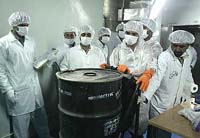Iran praises Russia, China for help in standoff with U.S.
Iran 's Foreign Ministry spokesman praised Russia and China on Tuesday for their opposition to the U.S. drive to impose U.N. sanctions on Iran for its nuclear program. "I have to commend Russia and China for their position. Russia and China have shown an independent policy, both in meetings with their partners and in their official statements," Hamid Reza Asefi told a press conference. Russia and China have opposed calls by the United States, Britain and France for a resolution that would threaten sanctions against Iran if its does not stop enriching uranium a process that produces fuel for nuclear reactors or material for atomic bombs. While Washington says military force remains an option in tackling Iran 's nuclear program, Moscow has ruled it out.

Iran won support Tuesday for its defiant stand on enrichment when the Nonaligned Movement, the world's biggest bloc after the United Nations, not only backed Tehran 's nuclear development but spoke out against any attack on the country. "Any attack, or threat of attack, against peaceful nuclear facilities operational or under construction poses a great danger to human beings and the environment," the Nonaligned Movement's foreign ministers said at the end of a two-day meeting in Malaysia .
The U.S. and some of its allies accuse Tehran of using its civilian nuclear program as a cover to produce nuclear weapons. Tehran denies this, saying its nuclear program is merely to generate electricity. The foreign ministers of the "big five" U.N. Security Council members and Germany are due to meet in Vienna, Austria, on Thursday to discuss proposals intended to reward Iran if it gives up uranium enrichment and punish it if it does not.
Asefi said Tuesday his government would reject any demand by the six countries for Iran to halt enrichment. "Definitely, we won't accept it. It's natural that we won't give up our rights," he told reporters. Iran maintains that as a signatory to the Nuclear Nonproliferation Treaty it has the right to enrich uranium for peaceful purposes such as the production of reactor fuel.
However, earlier this week Iran 's ambassador to the United Nations, Javad Zarif, was quoted by local newspapers as saying the country could curb its enrichment to resolve the crisis. Asefi did not dispute the Zarif's comment, but stressed that Tehran would continue its program as planned. "The issue of a halt (to our uranium enrichment) is not on our agenda. Iran is continuing its activities," he said.
The Security Council gave Iran until the end of April to suspend enrichment. But Iran ignored the demand and announced last month that it had successfully enriched uranium for the first time and was conducting research on advanced centrifuges to accelerate its production of the material. While Russia and China have declared their opposition to Iranian enrichment, they have opposed the tough measures that the United States wants to insert in a draft Security Council resolution on the issue. Moscow and Beijing have strong commercial ties with Iran , reports the AP.
N.U.
Subscribe to Pravda.Ru Telegram channel, Facebook, RSS!





